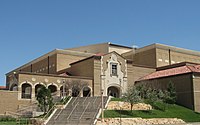United Supermarkets Arena
| Entertainment Showcase of West Texas | |
 |
|
| Former names | United Spirit Arena (1999–2014) |
|---|---|
| Location | 1701 Indiana Avenue Lubbock, TX 79409 |
| Coordinates | 33°34′52.54″N 101°53′11.89″W / 33.5812611°N 101.8866361°WCoordinates: 33°34′52.54″N 101°53′11.89″W / 33.5812611°N 101.8866361°W |
| Owner | Texas Tech University |
| Operator | Texas Tech University |
| Capacity | 15,098 (2001–present) 15,050 (1999–2001) |
| Surface | Hardwood |
| Construction | |
| Broke ground | March 26, 1997 |
| Opened | October 1, 1999 |
| Construction cost |
$62.775 million ($90.3 million in 2017 dollars) |
| Architect |
Rosser International Joe D. Mckay AIA Architects |
| Project manager | Hill International |
| General contractor | Centex Construction Co. |
| Tenants | |
| Texas Tech Red Raiders (NCAA DI) (1999–present) | |
United Supermarkets Arena (previously the United Spirit Arena) is a multi-purpose arena on the campus of Texas Tech University in Lubbock, Texas. The 15,098-seat arena opened in 1999 and is home to the Texas Tech Red Raiders basketball, Texas Tech Lady Raiders basketball and Texas Tech Red Raiders women's volleyball teams.
The City of Lubbock proposed replacing the Lubbock Municipal Coliseum with a new arena named after Buddy Holly. The proposed Buddy Holly Arena was to be located next to the Lubbock Memorial Civic Center in Downtown Lubbock, not on the Texas Tech University campus. A public referendum for a tax increase to build the arena failed to pass by as few as 600 votes. Texas Tech decided to move construction to an on campus facility with private donations on the university's campus.
The arena was financed from a $500 million fundraising endeavor undertaken by John T. Montford, the first chancellor of the Texas Tech University System. Ground breaking began on March 26, 1997. The arena opened on October 1, 1999, at a cost of $62.775 million.
The arena features a Spanish Renaissance exterior facade, matching architectural style of the rest of the Texas Tech University campus. Architects for the project included Joe D. Mckay AIA Architects, and Rosser International. Hill International was the project manager, and the general contractor was Centex Construction Co.
Standing at the southeast entrance of the arena is the 8-story Victory Tower. At 96 feet (29 m), Victory Tower is the 16th tallest structure in Lubbock.
...
Wikipedia
